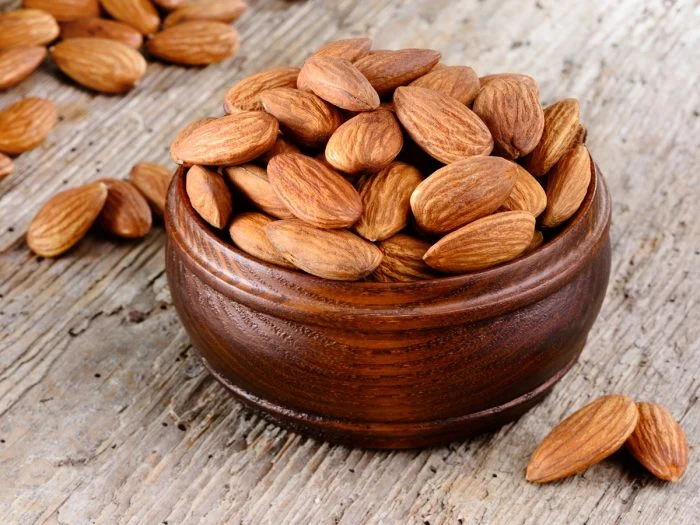Do you know that almond nuts are among the most popular and beneficial tree nuts in the world? They are extremely nutrient-dense, with high levels of beneficial fats, antioxidants, vitamins, and minerals.

Almond trees may have been one of the earliest trees that people cultivated in ancient times. In Jordan, archaeologists have found evidence of domesticated almond trees dating back some 5,000 years.
People can eat almonds raw or toasted as a snack or add them to sweet or savory dishes. They are also available sliced, flaked, slivered, as flour, oil, butter, or almond milk.
People call almonds nuts, but they are seedlings rather than true nuts.
In this article, we will highlight 9 health benefits of consuming almond nuts
Nutritional Fact of Almond Nut
The table below shows the amount of each nutrient scientifically proven in one ounce (28.4 g) of almonds. This is approximately equivalent to a handful of almonds, or around 23 almond kernels.
| Nutrient | Amount in 1 ounce | Daily adult requirement |
| Energy (calories) | 164 | 1,800–3,000 |
| Carbohydrate (g) | 6.1, including 1.2 g of sugar | 130 |
| Fat (g) | 14.2, of which 12.4 g is unsaturated | 20%–35% of daily calories |
| Fiber (g) | 3.5 | 25.2–30.8 |
| Protein (g) | 6.0 | 46–56 |
| Calcium (mg) | 76.3 | 1,000–1,200 |
| Iron (mg) | 1.0 | 8–18 |
| Magnesium (mg) | 76.5 | 310–420 |
| Phosphorus (mg) | 136 | 700 |
| Potassium (mg) | 208 | 4,700 |
| Zinc (mg) | 0.9 | 8–11 |
| Copper (mg) | 0.3 | 900 |
| Manganese (mg) | 0.6 | 1.8–2.3 |
| Selenium (micrograms or mcg) | 1.2 | 55 |
| Folate (mcg, DFE) | 12.5 | 300–400 |
| Vitamin E (mg) | 7.27 | 15 |
| Cholesterol | 0 | No data |
Furthermore, the table also shows how much an adult needs of each nutrient, according to the 2015–2020 Dietary Guidelines for Americans. Requirements differ on the individual’s gender, body mass, and age. A plant-based diet may be deficient in B vitamins, choline, and protein. Vegans can complement their nutritional needs by consuming almonds.

1. Almond nuts are an excellent source of antioxidants.
Antioxidants aid in the alleviation of oxidative stress, which can damage molecules in your cells and lead to irritation, aging, and diseases such as cancer. Almonds’ effective antioxidants are contained mostly in the brown layer of the skin.
As a result, blanched almonds (those with the skin removed) are not the healthiest option.
Over four weeks, a scientific investigation of 60 male smokers revealed that eating around 3 ounces (84 grams) of almonds per day lowered oxidative stress indicators by 23-34%.
These findings back with those of another study, which discovered that consuming Almonds with main meals lowered several oxidative damage markers. [1]
2. Great Source of Vitamin E
It’s not news that vitamin E belongs to the group of fat-soluble antioxidants. These antioxidants tend to accumulate in your body’s cell membranes, protecting them from oxidative damage.
Almonds are one of the greatest sources of vitamin E in the world, with just 1 ounce supplying 37% of the RDI.
Several studies have found that higher vitamin E intake is associated with a lower risk of heart disease, cancer, and Alzheimer’s disease. [2]
3. Loaded with Fiber
They originated in the Middle East, but the United States is now known as the world’s greatest producer.
Almonds are the edible seeds of the Prunus dulcis tree, sometimes known as the almond tree.
The shell is frequently removed from store-bought almonds, revealing the edible nut inside. They are available raw or roasted.
They are also used to make almond milk, oil, butter, flour, and marzipan paste.
Almonds have a high nutritional profile. (1) follows a 1-ounce (28-gram) serving of almonds:
- Fiber: 3.5 grams
- Protein: 6 grams
- Fat: 14 grams (9 of which are monounsaturated)
- Vitamin E: 37% of the RDI
- Manganese: 32% of the RDI
- Magnesium: 20% of the RDI
- They also contain a decent amount of copper,
vitamin B2 (riboflavin) and phosphorus.
A little handful, which contains only 161 calories and 2.5 grams of digestible carbs, provides all of this.
It is important to note that your body only absorbs 10-15% of the calories it consumes because some fat is inaccessible to digestive enzymes.
Almonds are also high in phytic acid, which binds to minerals and hinders them from being absorbed.
While phytic acid is widely regarded as a beneficial antioxidant, it does limit the amount of iron, zinc, and calcium obtained from almonds.
4. Aid Boosting Blood Sugar Control
Do you know that nuts are abundant in healthy fats, protein, and fiber while being low in carbohydrates? This makes them an excellent alternative for diabetics. Another advantage of almonds is their high magnesium content.
Magnesium is a mineral that is involved in over 300 biological activities, including blood sugar regulation.
Magnesium’s current RDI is 310-420 mg. 2 ounces of almonds provide nearly half that amount – 150 milligrams of this essential mineral.
Scientifically [4], It has been proven that people without diabetes also see major reductions in insulin resistance when supplementing with magnesium.
This further shows that high-magnesium foods such as almonds may help prevent metabolic syndrome and type 2 diabetes, both of which are major health problems.
5. Helps Regulate Blood Level

Interestingly, Almond nuts are loaded with magnesium. The magnesium in almonds is found to help lower blood pressure levels.
In our society today, high blood pressure is one of the leading factors of heart attacks, strokes, and kidney failure.
A magnesium deficit is significantly connected to high blood pressure, regardless of whether you are overweight.
According to research, addressing a magnesium deficit can considerably lower blood pressure. Because low magnesium levels are strongly connected to high blood pressure, almonds may help lower blood pressure.
If you do not satisfy the magnesium dietary guidelines, including almonds in your diet could help.
6. Effective for Weight loss
Losing or maintaining weight has always been challenging, however, nuts contain several nutrients that the body struggles to break down and digest.
A study has shown that the body does not absorb about ten to fifteen percent of the calories in nuts. also, some further research suggests that eating nuts can slightly boost metabolism. [6]
Although almonds are rich in calories, they do not appear to influence weight gain when consumed. Some studies even suggest that eating almonds can help you lose weight.
7. Reduce Cholesterol Levels
Evidently, high levels of LDL lipoproteins (commonly known as “bad” cholesterol) in the blood are well-known risk factors for heart disease.
Your diet might have a significant impact on your LDL levels. Almonds have been proven in several trials to effectively decrease LDL.
One or two handfuls of almonds per day can result in minor decreases in “bad” LDL cholesterol, potentially lowering the risk of heart disease.
A [7] 16-week trial based on research of 65 persons with prediabetes discovered that consuming 20% of their calories from almonds reduced LDL cholesterol levels by an average of 12.4 mg/dL.
8. Almonds Help to Reduce Hunger
Although nuts are low in carbohydrates, they are abundant in protein and fiber. According to research, consuming almonds and other nuts can promote fullness and help you eat fewer calories.
Protein and fiber have both been shown to increase feelings of fullness. This can assist you in eating fewer calories. Numerous more research back up nuts’ hunger-fighting abilities.
A four-week trial with 137 individuals found that a daily 1.5-ounce (43-gram) portion of almonds reduced hunger and desire to eat significantly. [8]
9. For Great skin and Strong Bones
When applied daily, the Vitamin E in almonds nourishes and softens the skin. Almond milk also protects the skin from the damaging effects of sun exposure. Its regular intake will also help with acne and pimples
Raw almonds are rich in phosphorus, magnesium, and calcium, all of which are good for your bones and teeth.






